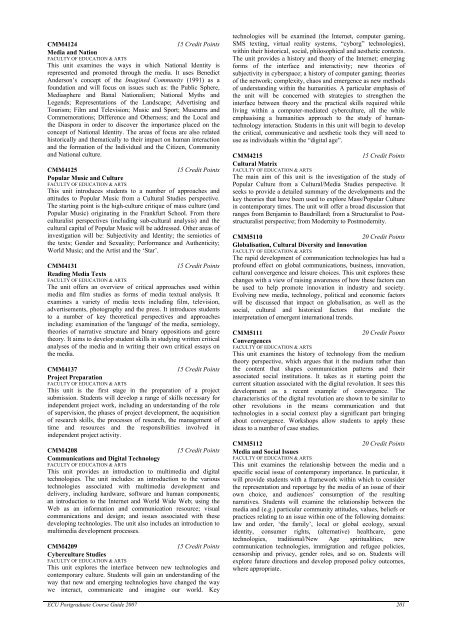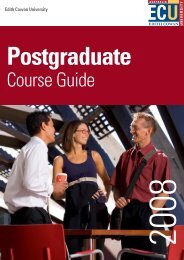Course Guide - Edith Cowan University
Course Guide - Edith Cowan University
Course Guide - Edith Cowan University
You also want an ePaper? Increase the reach of your titles
YUMPU automatically turns print PDFs into web optimized ePapers that Google loves.
CMM4124<br />
15 Credit Points<br />
Media and Nation<br />
FACULTY OF EDUCATION & ARTS<br />
This unit examines the ways in which National Identity is<br />
represented and promoted through the media. It uses Benedict<br />
Anderson’s concept of the Imagined Community (1991) as a<br />
foundation and will focus on issues such as: the Public Sphere,<br />
Mediasphere and Banal Nationalism; National Myths and<br />
Legends; Representations of the Landscape; Advertising and<br />
Tourism; Film and Television; Music and Sport; Museums and<br />
Commemorations; Difference and Otherness; and the Local and<br />
the Diaspora in order to discover the importance placed on the<br />
concept of National Identity. The areas of focus are also related<br />
historically and thematically to their impact on human interaction<br />
and the formation of the Individual and the Citizen, Community<br />
and National culture.<br />
CMM4125<br />
15 Credit Points<br />
Popular Music and Culture<br />
FACULTY OF EDUCATION & ARTS<br />
This unit introduces students to a number of approaches and<br />
attitudes to Popular Music from a Cultural Studies perspective.<br />
The starting point is the high-culture critique of mass culture (and<br />
Popular Music) originating in the Frankfurt School. From there<br />
culturalist perspectives (including sub-cultural analysis) and the<br />
cultural capital of Popular Music will be addressed. Other areas of<br />
investigation will be: Subjectivity and Identity; the semiotics of<br />
the texts; Gender and Sexuality; Performance and Authenticity;<br />
World Music; and the Artist and the ‘Star’.<br />
CMM4131<br />
15 Credit Points<br />
Reading Media Texts<br />
FACULTY OF EDUCATION & ARTS<br />
The unit offers an overview of critical approaches used within<br />
media and film studies as forms of media textual analysis. It<br />
examines a variety of media texts including film, television,<br />
advertisements, photography and the press. It introduces students<br />
to a number of key theoretical perspectives and approaches<br />
including: examination of the 'language' of the media, semiology,<br />
theories of narrative structure and binary oppositions and genre<br />
theory. It aims to develop student skills in studying written critical<br />
analyses of the media and in writing their own critical essays on<br />
the media.<br />
CMM4137<br />
15 Credit Points<br />
Project Preparation<br />
FACULTY OF EDUCATION & ARTS<br />
This unit is the first stage in the preparation of a project<br />
submission. Students will develop a range of skills necessary for<br />
independent project work, including an understanding of the role<br />
of supervision, the phases of project development, the acquisition<br />
of research skills, the processes of research, the management of<br />
time and resources and the responsibilities involved in<br />
independent project activity.<br />
CMM4208<br />
15 Credit Points<br />
Communications and Digital Technology<br />
FACULTY OF EDUCATION & ARTS<br />
This unit provides an introduction to multimedia and digital<br />
technologies. The unit includes: an introduction to the various<br />
technologies associated with multimedia development and<br />
delivery, including hardware, software and human components;<br />
an introduction to the Internet and World Wide Web; using the<br />
Web as an information and communication resource; visual<br />
communications and design; and issues associated with these<br />
developing technologies. The unit also includes an introduction to<br />
multimedia development processes.<br />
CMM4209<br />
15 Credit Points<br />
Cyberculture Studies<br />
FACULTY OF EDUCATION & ARTS<br />
This unit explores the interface between new technologies and<br />
contemporary culture. Students will gain an understanding of the<br />
way that new and emerging technologies have changed the way<br />
we interact, communicate and imagine our world. Key<br />
technologies will be examined (the Internet, computer gaming,<br />
SMS texting, virtual reality systems, “cyborg” technologies),<br />
within their historical, social, philosophical and aesthetic contexts.<br />
The unit provides a history and theory of the Internet; emerging<br />
forms of the interface and interactivity; new theories of<br />
subjectivity in cyberspace; a history of computer gaming; theories<br />
of the network; complexity, chaos and emergence as new methods<br />
of understanding within the humanities. A particular emphasis of<br />
the unit will be concerned with strategies to strengthen the<br />
interface between theory and the practical skills required while<br />
living within a computer-mediated cyberculture, all the while<br />
emphasising a humanities approach to the study of humantechnology<br />
interaction. Students in this unit will begin to develop<br />
the critical, communicative and aesthetic tools they will need to<br />
use as individuals within the “digital age”.<br />
CMM4215<br />
15 Credit Points<br />
Cultural Matrix<br />
FACULTY OF EDUCATION & ARTS<br />
The main aim of this unit is the investigation of the study of<br />
Popular Culture from a Cultural/Media Studies perspective. It<br />
seeks to provide a detailed summary of the developments and the<br />
key theories that have been used to explore Mass/Popular Culture<br />
in contemporary times. The unit will offer a broad discussion that<br />
ranges from Benjamin to Baudrillard; from a Structuralist to Poststructuralist<br />
perspective; from Modernity to Postmodernity.<br />
CMM5110<br />
20 Credit Points<br />
Globalisation, Cultural Diversity and Innovation<br />
FACULTY OF EDUCATION & ARTS<br />
The rapid development of communication technologies has had a<br />
profound effect on global communications, business, innovation,<br />
cultural convergence and leisure choices. This unit explores these<br />
changes with a view of raising awareness of how these factors can<br />
be used to help promote innovation in industry and society.<br />
Evolving new media, technology, political and economic factors<br />
will be discussed that impact on globalisation, as well as the<br />
social, cultural and historical factors that mediate the<br />
interpretation of emergent international trends.<br />
CMM5111<br />
20 Credit Points<br />
Convergences<br />
FACULTY OF EDUCATION & ARTS<br />
This unit examines the history of technology from the medium<br />
theory perspective, which argues that it the medium rather than<br />
the content that shapes communication patterns and their<br />
associated social institutions. It takes as it starting point the<br />
current situation associated with the digital revolution. It sees this<br />
development as a recent example of convergence. The<br />
characteristics of the digital revolution are shown to be similar to<br />
other revolutions in the means communication and that<br />
technologies in a social context play a significant part bringing<br />
about convergence. Workshops allow students to apply these<br />
ideas to a number of case studies.<br />
CMM5112<br />
20 Credit Points<br />
Media and Social Issues<br />
FACULTY OF EDUCATION & ARTS<br />
This unit examines the relationship between the media and a<br />
specific social issue of contemporary importance. In particular, it<br />
will provide students with a framework within which to consider<br />
the representation and reportage by the media of an issue of their<br />
own choice, and audiences’ consumption of the resulting<br />
narratives. Students will examine the relationship between the<br />
media and (e.g.) particular community attitudes, values, beliefs or<br />
practices relating to an issue within one of the following domains:<br />
law and order, ‘the family’, local or global ecology, sexual<br />
identity, consumer rights, (alternative) healthcare, gene<br />
technologies, traditional/New Age spiritualities, new<br />
communication technologies, immigration and refugee policies,<br />
censorship and privacy, gender roles, and so on. Students will<br />
explore future directions and develop proposed policy outcomes,<br />
where appropriate.<br />
ECU Postgraduate <strong>Course</strong> <strong>Guide</strong> 2007 201



